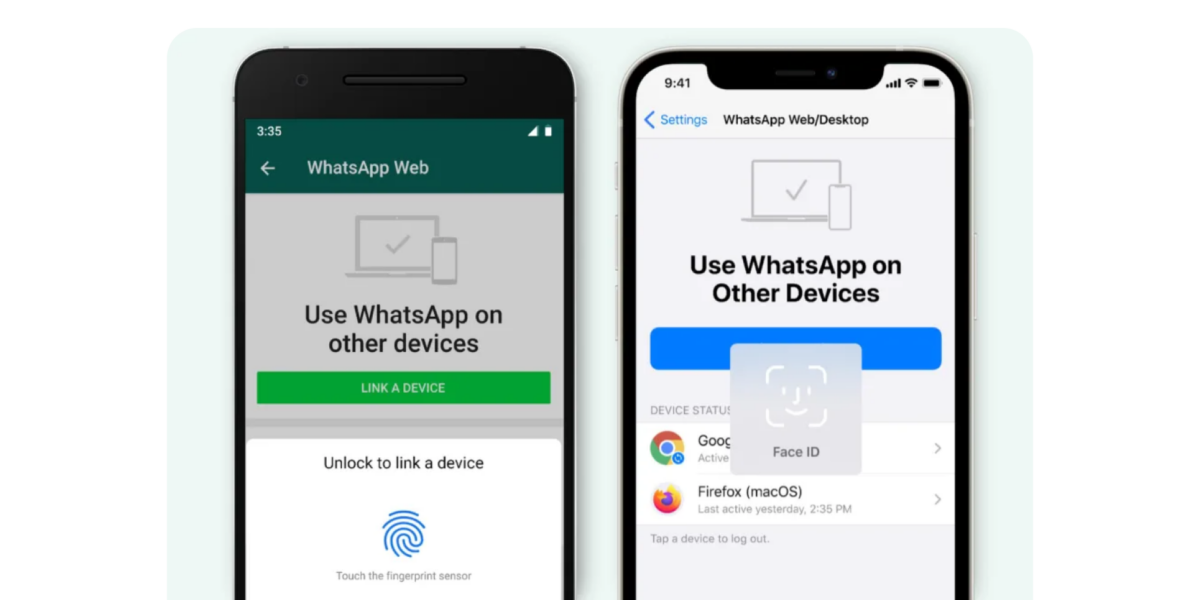
WhatsApp Introduces New Mobile Security Features
WhatsApp Introduces New Mobile Security Features! Seriously upping their game, WhatsApp has rolled out a significant update focusing on enhanced security and privacy for its users. This isn’t just a minor tweak; we’re talking about substantial improvements to how your messages and data are protected, impacting everything from end-to-end encryption to privacy settings. Get ready to dive into the details of what this means for you.
This update addresses many user concerns, particularly regarding data protection in today’s digital landscape. From improved message security protocols to enhanced privacy controls, WhatsApp is clearly aiming to solidify its position as a leader in secure messaging. We’ll explore the new features, how they work, and what they mean for your overall online safety and peace of mind.
New Security Features Overview

WhatsApp’s recent update brings a significant boost to user security, addressing growing concerns about privacy and data protection in the digital age. These enhancements build upon existing security measures, providing a more robust and comprehensive defense against potential threats. The improvements are designed to benefit all users, from casual texters to businesses relying on WhatsApp for communication.
The core features introduced include enhanced end-to-end encryption, improved account protection mechanisms, and more transparent control over data sharing. These features represent a significant leap forward compared to previous versions, offering stronger safeguards against unauthorized access and data breaches. For example, the new end-to-end encryption protocol is more resilient against advanced attacks, and the account protection features make it significantly harder for malicious actors to gain control of user accounts.
The enhanced transparency in data sharing allows users to better understand and manage what information is being collected and how it is used.
Target Audience for Enhanced Security
These new security enhancements are designed to benefit all WhatsApp users, regardless of their technical expertise or level of online activity. However, certain user groups will see more pronounced benefits. High-profile individuals, businesses handling sensitive information, and users concerned about online privacy will particularly appreciate the increased security offered by these features. The enhanced encryption, for instance, provides an extra layer of protection for confidential conversations, while the improved account security features deter unauthorized access attempts.
Comparison of Old and New Security Features
The following table details the key differences between the old and new security features implemented in the latest WhatsApp update. It highlights the improvements achieved in each area, emphasizing the enhanced protection now available to users.
| Feature Name | Old Version | New Version | Improvement |
|---|---|---|---|
| End-to-End Encryption | Standard end-to-end encryption | Enhanced end-to-end encryption with improved key management and resistance to advanced attacks. | Significantly increased resistance to sophisticated decryption attempts, offering stronger protection against data breaches. |
| Account Protection | Two-step verification | Two-step verification with enhanced security prompts and automated account recovery measures. | Reduced risk of account hijacking through more robust verification processes and streamlined recovery options. |
| Data Sharing Transparency | Limited data sharing information | Detailed information on data collection practices, including types of data collected and how it is used. Improved user control over data sharing settings. | Increased user control and understanding of data usage, promoting greater transparency and accountability. |
| Suspicious Activity Alerts | Basic login alerts | Real-time alerts for suspicious login attempts from unfamiliar devices, along with options to immediately block access. | Faster response to potential security threats, allowing users to quickly mitigate risks. |
Enhanced Privacy Settings: Whatsapp Introduces New Mobile Security Features
WhatsApp’s recent update brings significant improvements to user privacy, offering more granular control over data sharing and access. These enhancements build upon existing features, providing users with a more secure and personalized experience. The changes directly impact how your information is handled within the app and how you interact with contacts.
The updated privacy settings offer a more nuanced approach to data control, empowering users to manage their privacy preferences with greater precision. This includes more options for who can see your last seen status, profile photo, about section, and more. The implications for user privacy are substantial, allowing for a more tailored level of interaction and information sharing based on individual preferences and comfort levels.
Updated Last Seen, Profile Photo, and About Privacy Settings
Previously, users could only choose between “Everyone,” “My Contacts,” and “Nobody” for visibility settings. Now, WhatsApp offers more granular control. For example, you can choose to hide your “Last Seen” from specific contacts while still sharing it with others. This allows for selective sharing of information, providing a better balance between connection and privacy. This functionality extends to your profile photo and “About” section, offering the same level of customizable visibility.
WhatsApp’s new security features are a welcome update, especially considering how much personal data we share. Building secure apps like WhatsApp requires robust development, and that’s where understanding the power of platforms like Domino comes in; check out this article on domino app dev the low code and pro code future to learn more. Ultimately, advancements in both app security and development methods are crucial for a safer digital world.
Managing Group Privacy Settings
The updated privacy settings also affect group participation. These changes provide users with more control over who can add them to groups. This prevents unwanted additions to groups, enhancing user control over their participation in group chats and reducing unsolicited communication. This is particularly helpful in mitigating spam and unwanted interactions.
- Go to WhatsApp Settings.
- Tap on “Account” and then “Privacy”.
- Under “Group,” select either “Everyone,” “My Contacts,” or “Nobody”.
- “Everyone” allows anyone to add you to groups. “My Contacts” only allows those in your contact list to add you. “Nobody” prevents anyone from adding you to groups without your explicit consent.
Controlling Who Can See Your Online Status
Similar to the other privacy settings, WhatsApp now allows users to control who can see their “Online” status. This allows users to maintain a degree of privacy even while actively using the app. This feature helps to maintain a balance between online availability and personal privacy preferences.
- Navigate to WhatsApp Settings.
- Select “Account,” then “Privacy.”
- Under “Online,” choose “Everyone,” “My Contacts,” or “Nobody” to determine who can see your online status.
Step-by-Step Guide to Configuring New Privacy Settings
Activating and configuring these new privacy settings is straightforward. The process is consistent across different sections, allowing for a seamless user experience.
- Open the WhatsApp application on your mobile device.
- Tap the three vertical dots in the upper right corner to access the settings menu.
- Select “Settings”.
- Tap “Account”, followed by “Privacy”.
- You will now see a list of privacy settings, including “Last Seen,” “Profile Photo,” “About,” “Groups,” and “Online.” For each setting, tap to choose your preferred visibility: “Everyone,” “My Contacts,” or “Nobody.” In some cases, more granular options may be available, allowing you to exclude specific contacts.
Improved Message Security

WhatsApp’s latest update boasts significant improvements in message security, aiming to provide users with a more private and protected communication experience. This enhanced security goes beyond simply encrypting messages; it involves a multi-layered approach designed to mitigate various threats and vulnerabilities. The improvements offer a substantial leap forward in protecting user conversations from unauthorized access.The new features build upon WhatsApp’s existing end-to-end encryption, adding several layers of protection.
For example, the improved system now includes enhanced protection against metadata manipulation, making it harder for malicious actors to track or infer information about conversations even without directly accessing the message content. Imagine a scenario where someone attempts to tamper with the metadata to identify the participants or timing of a message; the new features make such attempts far less likely to succeed.
Another example is the strengthened protection against SIM swapping attacks, a technique often used to gain access to accounts by redirecting authentication messages.
End-to-End Encryption Implementation Details
WhatsApp utilizes the Signal Protocol for its end-to-end encryption. This protocol ensures that only the sender and recipient can read the messages; WhatsApp’s servers cannot decrypt the content. The implementation involves generating unique cryptographic keys for each conversation, encrypting the messages with these keys, and securely exchanging the keys between the communicating parties. This process is transparent to the user; they don’t need to manually manage keys or understand the complex cryptographic details.
The updated version strengthens the key exchange mechanism, making it more resistant to various attacks, including man-in-the-middle attacks, where an attacker intercepts the communication to eavesdrop or tamper with the messages. The Signal Protocol’s design ensures that even if a server is compromised, the message content remains protected.
Comparison with Competitor Security Protocols
While many messaging apps claim to offer end-to-end encryption, the implementation and security protocols vary. Some competitors may use proprietary protocols with less scrutiny from the security community, potentially leaving them vulnerable to exploits. WhatsApp’s use of the well-vetted and widely-audited Signal Protocol provides a higher level of confidence in its security compared to less transparent or less rigorously tested alternatives.
The open-source nature of the Signal Protocol also allows independent security researchers to review and audit the code, identifying and addressing potential weaknesses more effectively.
Potential Remaining Vulnerabilities
Despite the improvements, some potential vulnerabilities remain. While end-to-end encryption protects the message content, other aspects of the communication are still susceptible to attacks.
- Client-side vulnerabilities: Weaknesses in the WhatsApp application itself (on users’ devices) could allow attackers to compromise the encryption process or steal keys.
- Phishing attacks: Users can be tricked into revealing their account information or installing malicious software, bypassing the security features of the app.
- Network vulnerabilities: Compromised or insecure network connections could potentially allow interception of encrypted messages, although the content would remain unreadable without the correct decryption keys. This is less of a concern with secure networks, but still a potential vulnerability.
- Metadata exposure: While improved, metadata such as timestamps and participant information could still be potentially accessible to malicious actors depending on other factors, such as network configurations.
User Experience and Usability
The new WhatsApp security features aim to enhance user privacy and data protection, but this inevitably impacts the user experience. While the improvements are significant, some adjustments to user workflows and a slight learning curve are to be expected. Understanding these changes and how to navigate them effectively is crucial for a smooth transition.The introduction of more robust security measures might initially feel slightly more complex.
Features like enhanced privacy settings offer granular control, but this increased control requires users to actively engage with and understand these settings. This means spending a bit more time configuring preferences to their liking, which could be perceived as a minor inconvenience for some. However, this investment of time translates to significantly improved security and peace of mind.
Potential User Challenges
Users might encounter challenges understanding the nuances of the new features, particularly those unfamiliar with more advanced security settings. For instance, the detailed control over who can see your profile picture, last seen, and about section may require some exploration to fully grasp. Another potential challenge lies in troubleshooting issues that might arise from the new security protocols, such as problems with message delivery or contact syncing.
Troubleshooting Common Issues
One common issue could be difficulties receiving messages from contacts who have not updated to the latest version of WhatsApp. In this case, informing contacts to update their app is the primary solution. If issues persist with message delivery, checking internet connectivity and restarting the app are standard troubleshooting steps. Problems with contact syncing might require reviewing the app’s permission settings on the device, ensuring contacts are properly enabled for access within WhatsApp.
In persistent cases, contacting WhatsApp support directly might be necessary.
Illustrative Scenario: Using Two-Step Verification, Whatsapp introduces new mobile security features
Imagine Sarah, a WhatsApp user concerned about unauthorized access to her account. She activates the two-step verification feature. This requires her to create a six-digit PIN. Now, even if someone gains access to her phone number, they cannot access her WhatsApp account without entering this PIN. If Sarah forgets her PIN, she can use a recovery email address she previously set up to regain access.
This simple yet effective feature significantly bolsters the security of her account.
Impact on Data Security and Privacy
WhatsApp’s newly implemented security features represent a significant leap forward in protecting user data and privacy. These enhancements build upon existing security protocols, offering users a more robust and comprehensive defense against potential threats. The impact is multifaceted, affecting both individual users and businesses leveraging the platform.The effectiveness of these features in preventing data breaches and unauthorized access hinges on several factors, including the ongoing evolution of cyber threats and user behavior.
However, the measures implemented demonstrably strengthen WhatsApp’s security posture. For instance, end-to-end encryption, already a cornerstone of WhatsApp’s security, is further reinforced by these updates, making it considerably harder for malicious actors to intercept and decipher messages. Improved authentication methods also add layers of protection, reducing the risk of unauthorized account access.
Enhanced Data Encryption and Protection
WhatsApp’s commitment to end-to-end encryption remains paramount. The new features refine this encryption, making it more resilient against advanced cryptographic attacks. This means that only the sender and recipient can read messages, preventing unauthorized access even if WhatsApp’s servers are compromised. Further improvements involve enhanced key management and more robust protocols for securing metadata associated with messages.
This addresses concerns surrounding potential inferences that could be drawn from metadata even with end-to-end encryption in place.
Improved Account Security Measures
The new security features include strengthened account security measures designed to prevent unauthorized access. This involves improvements to password security, including stricter password policies and enhanced protection against brute-force attacks. Multi-factor authentication (MFA) options have also been refined, providing users with multiple layers of verification to ensure only authorized individuals can access their accounts. The implementation of more sophisticated detection mechanisms for suspicious login attempts further bolsters account security, alerting users to potential threats in real-time.
Benefits for WhatsApp Business Users
The enhanced security features offer significant benefits for businesses using WhatsApp Business. The improved data protection measures build trust with customers, assuring them that their interactions are secure and private. This is crucial for businesses handling sensitive customer information, such as financial details or personal data. Furthermore, the enhanced security reduces the risk of data breaches that could damage a business’s reputation and lead to legal liabilities.
The strengthened authentication processes also help protect business accounts from unauthorized access, preventing potential disruptions to operations and safeguarding sensitive business data. This ultimately contributes to a more secure and reliable communication platform for business transactions and customer interactions.
Future Implications and Developments
WhatsApp’s recent security enhancements represent a significant step forward, but the ever-evolving landscape of cyber threats necessitates a proactive and adaptive security strategy. The future of WhatsApp’s security will likely involve a continuous cycle of improvement, driven by both technological advancements and the emergence of new attack vectors.The company will need to invest heavily in research and development to stay ahead of sophisticated cybercriminals.
This will involve exploring and implementing cutting-edge cryptographic techniques, enhancing AI-powered threat detection systems, and strengthening its infrastructure to withstand increasingly complex attacks. The success of these efforts will directly impact user trust and the platform’s overall competitiveness.
Potential Security Challenges
Maintaining a robust security infrastructure for a platform with billions of users presents immense challenges. One significant hurdle will be managing the sheer volume of data transmitted daily. The potential for data breaches increases exponentially with scale, demanding advanced security measures and rigorous data protection protocols. Another challenge lies in balancing security with user experience. Overly restrictive security measures could compromise usability, potentially leading to user dissatisfaction and reduced adoption.
The delicate balance between security and usability will continue to be a critical design consideration. For example, while end-to-end encryption is vital, managing its complexity and ensuring its proper implementation across all platforms remains an ongoing challenge.
Influence on Other Messaging Platforms
WhatsApp’s security improvements will undoubtedly influence the strategies of competing messaging platforms. The pressure to adopt similar, or even more advanced, security measures will increase. We can expect a ripple effect, prompting other platforms to invest more heavily in their own security infrastructure and user privacy features. This competitive landscape will ultimately benefit users, who will enjoy greater security and privacy across various messaging apps.
This could lead to a standardization of security protocols, resulting in a safer online communication environment overall. For instance, if WhatsApp successfully implements a new form of biometric authentication, other platforms will likely follow suit to remain competitive.
Hypothetical Future Security Threat and Mitigation
Imagine a future scenario where a highly sophisticated AI-powered phishing campaign targets WhatsApp users. This campaign uses deepfakes and highly personalized messages to bypass existing security protocols and trick users into revealing sensitive information or installing malware. To counter this, WhatsApp might leverage advanced machine learning algorithms to detect and flag suspicious messages, potentially integrating AI-powered authentication methods that analyze user behavior patterns to identify and block fraudulent activities.
This might include analyzing typing patterns, message frequency, and recipient selection to identify anomalies indicative of compromised accounts. Additionally, improved user education and awareness campaigns will be critical in mitigating the risk of such attacks. This multi-layered approach – combining advanced technology with user education – is likely to be the most effective strategy for combating such threats.
Final Review
Ultimately, WhatsApp’s new mobile security features represent a significant step forward in protecting user data and privacy. While no system is completely impenetrable, these enhancements demonstrate a commitment to strengthening security measures and responding to evolving threats. It’s a welcome update for anyone who values their online security and privacy, offering a more robust and secure messaging experience.
Stay tuned for future developments – the digital world is constantly evolving, and so must our security practices!
Clarifying Questions
Will these updates slow down my WhatsApp experience?
WhatsApp aims to make these security improvements seamless. While there might be minor performance variations depending on your device, significant slowdowns are unlikely.
Are my older messages also protected by these new features?
The new features primarily protect messages sent
-after* the update. While existing messages benefit from WhatsApp’s existing end-to-end encryption, they won’t receive the added layer of protection from these new features.
What if I’m using an older version of WhatsApp?
Updating to the latest version is highly recommended to benefit from the enhanced security features. Older versions may lack crucial security patches.
Do these updates affect my WhatsApp Business account differently?
The updates apply to both personal and business accounts, offering enhanced security and privacy across the board.





